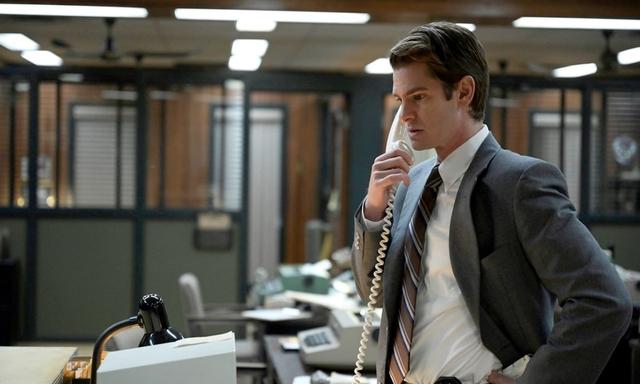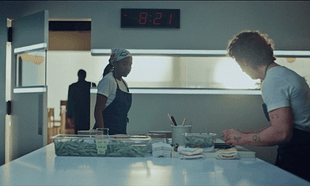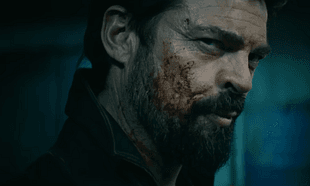Andrew Garfield's career of late has had an interesting fixation on faith and religion, specifically the loss of the former and the corrupting influence of the latter. In Martin Scorsese's elegiac 'Silence', he played a Jesuit sent to Japan to find their mentor and, in the process, encounters violent prosecution and finds their faith challenged at every turn. Just last year, 'The Eyes of Tammy Faye' saw Garfield play disgraced televangelist Jim Bakker under layers of makeup. In 'Under The Banner of Heaven', Garfield plays a devout Mormon detective who finds himself at odds with his religion when he encounters the brutal murder of a young mother - played by Daisy Edgar-Jones - and her fifteen-month-old daughter.
The story is based in part on the true-crime book of the same name and the Lafferty murder case of 1984, but also interweaves an examination of the Mormon religion and specifically, the code of silence it holds over its faithful and the bloody and violent past it protects. It's weighty stuff, made all the more intriguing by the fact that showrunner Dustin Lance Black is himself an ex-Mormon, while the Mormon Church has rejected 'Under The Banner of Heaven' as demonising them with inaccurate representations of their faith.
From the first couple of episodes, it's clear that Dustin Lance Black is using 'Under The Banner of Heaven' to unpack a lot of feelings he has on Mormonism and religion in general, both in how it can completely overcome rational thought and logic, but also in how it affirms itself by being surrounded by it constantly. Every time Garfield's character approaches another Mormon, he refers to himself as Brother Pyre. Religious leaders stride into police stations and get people released with a wave and a smile. Shifting glances are given when Gil Bermingham's character, a non-Mormon and a Native American to boot, is present. Indeed, the state of Utah is basically presented as a theocracy, with religious doctrine holding unbelievable sway over day-to-day lives, all of it adding to the oppressive atmosphere that the show naturally presents.
Scottish director David Mackenzie, who previously made the excellent 'Hell or High Water', knows how to place period details in the background and give an air of authenticity to proceedings, not to mention needling out the underlying tensions and violence that seem to be present in American culture and is so often overlooked by directors from there. Dustin Lance Black's script is, however, somewhat heavy-handed with the exposition, as well as providing one too many setups for a musical montage of emotions. Yet, for their part, the cast work together beautifully.
Andrew Garfield is able to play the loss of faith with real vigour, and by the later episodes, you can really see him struggle with not only the absence of comfort in his religion, but how it's condemned his wife and daughter too. The always reliable Gil Bermingham is an excellent foil to Garfield, providing a much more worldly presence to his often forced piety. Daisy Edgar-Jones' performance is a little strained in parts, and is very often placed on the short end of things while her on-screen husband, Billy Rawle, gets all of the meaty scenes. Likewise, Rawle's on-screen elder brothers - Wyatt Russell, Sam Worthington, and Rory Culkin - dominate whenever they're there. Russell, in particular, is able to capture the manic energy that so often pervades self-proclaimed religious visionaries, while Worthington's reluctant messiah has much deeper issues that only come forth in later episodes.
'Under The Banner of Heaven' does take its sweet time to get going, and given how there's a glut of true-crime stories out there, it's entirely possible that this series will slip past people's attention on this basis. Yet, if you're able to devote the time, it provides for one of the most searing true-crime shows of the year and features some excellent performances along the way.




















































































